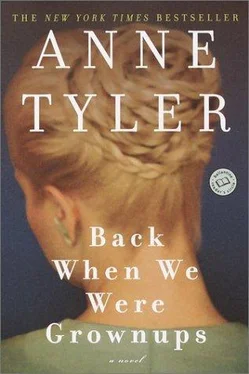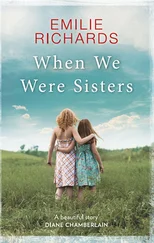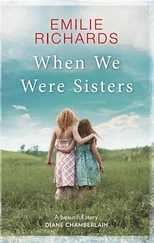A new card flashed on the screen: Christmas 1956. By now Uncle Buddy must have grasped the capabilities of his medium, for the scene was almost too animated. An electric train whizzed soundlessly around the base of a Christmas tree before it was obliterated by somebody’s swirling plaid skirt. An out-of-focus child (Zeb again, suddenly taller) lunged gleefully toward the camera with a red metal dump truck in one hand. Then Joe (Joe! so young and graceless that Rebecca almost didn’t know him, with his hair too short and his neck too thin) plucked Zeb up and removed him, and Mother Davitch advanced displaying a velvet-boxed bottle of perfume as if she were in a commercial, smiling a determined smile that was almost scary. She was followed, as if in a conga line, by Aunt Joyce vampishly modeling a pink angora sweater with a tag dangling from the top button, and then by Poppy holding a cellophane-wrapped bow tie in front of the bow tie he was already wearing. Last, a hairy arm was tugged into view by someone else’s hand, and a shirtfront loomed up, and then a man’s widely laughing, protesting mouth. “Uncle Buddy himself, in his one and only film appearance,” Zeb had time to announce before the whole scene vanished.
The children were asking, “Where were you, Mom?” and their mothers were saying, “Just wait a minute. I wasn’t even born yet.” Poppy was telling Mr. Ames to take his word for it: this was not really the way things had been. More Christmases swam by— Christmas 1957 and Christmas 1958. “Uncle Buddy lived in Delaware,” Zeb explained. “He didn’t get to visit more than once or twice a year.” The train beneath the tree acquired more cars; Poppy acquired more bow ties; Zeb grew another six inches. “Stardust” went on playing languorously, although Mr. Hardesty pointed out that some sort of Christmas carol might have been more in keeping. As if to prove him wrong, the next card read Spring 1961, and when it was removed, Joe and a glamorous, cross-looking Tina were standing on the front stoop with a cylinder of pastel blankets. “That’s me!” Biddy told the children, although she would have known that only because of the date. The clearest part of the picture was an arching bough of pink blossoms extending from the side of the screen where the front-parlor window would have been, and for some reason, this evidence of a long-dead, long-forgotten tree that Rebecca herself had never laid eyes on made her sadder than anything else. Poppy, too, gave a sigh. “Ah, me,” he said, and he gently stroked his mustache.
Christmas 1962, Christmas 1964. Easter 1965 and Christmas 1965 and Easter 1966. Biddy pushed a doll buggy and Patch learned to roller-skate and NoNo shook the bars of her playpen. Joe turned into the man Rebecca had married. Poppy’s hair was gray but Aunt Joyce’s was a yellower blond than ever. Mother Davitch’s mouth started blurring around the edges.
Then September 1966, and who was this? A heavyset young woman standing in front of a picnic table, wearing a silly miniskirt that exposed her broad thighs. Her face was large and shiny. Rebecca felt embarrassed for her; she seemed like such an interloper, so presumptuous, beaming straight at the camera while other, more entitled people (Mother Davitch, Aunt Joyce) wrapped leftovers in waxed paper.
She slid a glance around the audience, but nobody made any comment.
Christmas 1967, and Min Foo scowled from her father’s arms, her two clenched fists like tiny spools of thread. “There I am!” Min Foo said, hugging Lateesha on her lap.
As if Min Foo’s arrival had been the whole point of the movie, a card proclaiming The End promptly filled the screen. A few people clapped. Then another card popped up listing family members in order of appearance. Paul P. Davitch, Joyce Mays Davitch, Zebulon Davitch, M.D…. Rebecca went on watching, transfixed, but the children were drifting away now and the adults had started talking among themselves. Biddy called, “Folks? Are you listening? Cake will be served in the dining room.” Emmy and Joey were elbowing each other for space on the piano bench; Lateesha was chasing balloons; Poppy was telling J.J. that Joyce had been much prettier than the camera made her out to be.
The credits ended, followed by more snow. Rebecca bent to press the Rewind button, and then she went out to the dining room where a sizable group already stood admiring the mammoth birthday cake.
“My name wasn’t on the card,” she told Zeb.
Without turning, he said, “Hmm?”
“They didn’t list me on the card when they rolled the credits.”
Miss Nancy plucked Rebecca’s sleeve. “Could I just say something?” she asked. “In view of Mr. Davitch’s limitations, I’m not at all in favor of ankle weights for his walks.”
From behind them, Min Foo said, “Didn’t I tell them so? Didn’t I tell Patch? ‘The poor man can barely stagger around as it is,’ I said, ‘and now you want to tie lead weights to his ankles?’”
“I heard that!” Patch called from the other side of the room. “Criticize, criticize! Why don’t you say it to my face, if that’s how you feel?”
“I did say it to your face.”
Meanwhile, Rebecca’s mother was telling Alice Farmer how well the folks in Church Valley got along with the Colored; Haydn was resuming on the stereo; Emmy and Joey were playing “Heart and Soul” on the piano. Biddy was using the butane torch to light the candles on the cake — an actual one hundred candles, as Rebecca had insisted, plus an extra to grow on. They ringed each of the lower tiers and completely covered the top except for the center, where a little ceramic man stood — one half of a bride-and-groom set — wearing a black tailcoat and a tiny, bushy mustache very much like Poppy’s. “Aww,” several people said when they saw him. Poppy himself watched gravely, standing very straight with both hands on the crook of his cane.
Now Barry started singing “Happy Birthday,” swooping his arms above his head like an orchestra conductor. It was good to have somebody else, for a change, play the part of cruise-ship director. Rebecca chimed in on the second note, and the others joined by twos and threes as the song continued. “ Happy birthday to you, happy birthday to you… ”
At the end, as always, a couple of the children went on singing. “ How o-old are you, how o-old are you… ” Their voices were so frail that Rebecca could hear, besides, Haydn on the stereo and “Heart and Soul” on the piano and “Stardust” on the VCR, which somebody must have started running all over again. The Military Symphony — at least this second section of it, whatever it was called — didn’t sound military at all; it sounded delicate and sad. And “Heart and Soul” had always struck her as so haunting, such an oddly haunting melody in view of the fact that it was literally child’s play. And anyone would agree that “Stardust” was a melancholy song. So that was probably why, in the middle of “How Old Are You?” she felt an ache of homesickness, right there in her own house.
But she brushed it aside, and, “Make a wish! Make a wish!” she chanted, until the others took it up. Poppy braced himself, sucked in a huge breath, and blew out every last candle.
Well, he did have help. Danny and Peter, whom he must have enlisted earlier, leaned forward at either side of him and blew when he did, which made everybody laugh. “It still counts, though!” Poppy said. “I still get my wish. Don’t I?”
“Of course you do,” Rebecca told him.
She stepped forward to take his arm, planning to settle him in a chair, but he resisted. Instead he stood for a long, silent moment watching Biddy pluck the candles from the cake. “Boy, that is kind of pitiful,” he said finally. “A groom without his bride like that.”
Читать дальше












